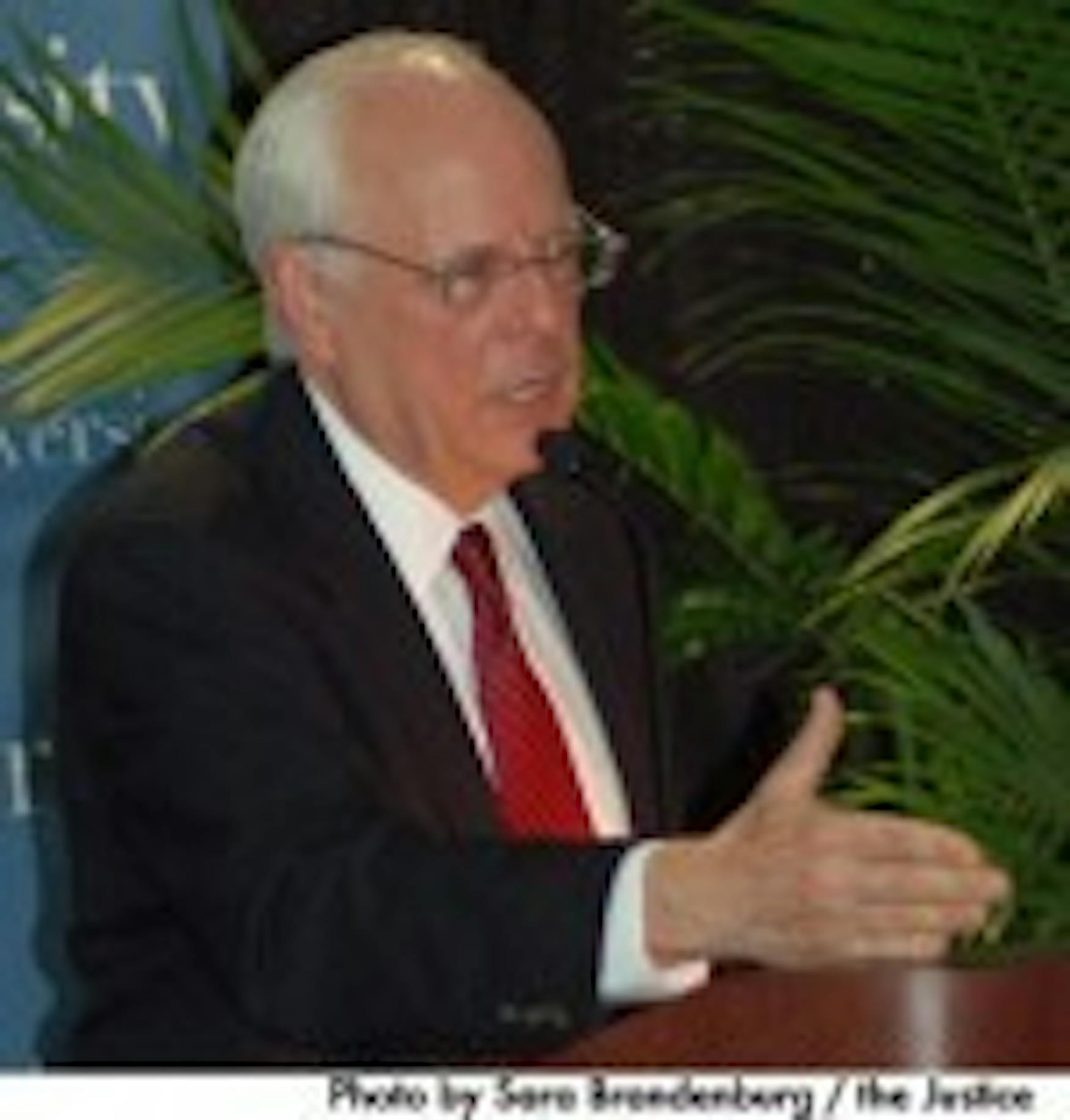John Dean shuns secrecy
A Washington, D.C., insider under former President Richard Nixon during the Watergate scandal, John W. Dean said last Tuesday at Brandeis that the current Bush Administration's underhanded practices have been even more egregious.Dean, President Nixon's legal counsel during Watergate, expressed his worries about the state of investigative reporting and the secrecy of the Bush administration during the inaugural address for the Gerald and Elaine Schuster Institute for Investigative Journalism at the Faculty Club.
Dean, whose Senate testimony played a vital role in exposing the president's role in the scandal, also addressed this issue in his 2004 book Worse than Watergate. His last three books, however, have focused on Bush's tenure, including his latest work, Broken Government, which was published in 2007.
Last January, Elaine and Gerald Schuster donated $5 million to the Institute, which grew out of the Women's Studies Research Center in Sept. 2004 and employs both students and professional reporters. It is the first independent investigative institute based at a university, and Dean praised its existence, calling it "cutting edge."
"I can only hope [the Institute is] being replicated around the country," he said.
In his lecture, called "Holding power accountable," Dean discussed the state of investigative reporting-or lack thereof-and reminisced about his time in Washington in the early '70s during Watergate.
"Thank you Mr. President, I assume you're not taping tonight?" Dean asked when he entered the stage after University President Jehuda Reinharz's introduction, alluding to his taped conversations with Nixon. "That's a question I started asking presidents lately," he joked.
While the press gave presidents before Watergate "the benefit of the doubt," that was no longer the case afterwards, Dean said. This attitude persisted during the presidencies of Jimmy Carter and Ronald Reagan, often resulting in what Dean called "over-investigation," and reached its peak during Bill Clinton's term with the coverage of the Monica Lewinsky affair.
While Dean described the reporting of the Watergate scandal as "the birth of investigative journalism," he said the real power of the?Washington Post's coverage lay in its decision to keep the story on the front page, not in the content of the reporting itself.
"They didn't write one story that gave us the concern that they knew what was going on," he said. "The Washington Post enterprise deserved a Pulitzer, but they really didn't crack the story at all."
Keeping the story on the front page annoyed the president's press office and made it an important news item. "That's the press' role," Dean said.
His criticism of the current administration became evident immediately, although he covered it up with humor when talking about Bush's visit to Southern California last week in wake of the wildfires. "I am just happy he didn't dress up as a fireman, saying 'Mission accomplished,'" he said.
Dean said the current situation is "probably much worse" than Watergate. During Watergate, "nobody died. Nobody was tortured. We're playing in a whole different league today."
Dean decided to write about what he thought the media was neglecting. "Nobody is holding Republicans accountable for their actions," he said. He said the lack of transparency in the executive office today is particularly troubling.
"This administration has been more effective than any predecessors at stiff -arming the press," he said.
Bush's appointment of conservative justices to the Supreme Court is another of Dean's worries. There are currently four "fundamentalist" justices and adding one more, he said, could dramatically change legislation in this country. Dean said this should be an issue in the 2008 presidential race.
Dean also worked as an investment banker since his departure from Washington.
He now lives in California and has taught at the University of Southern California for seven years.
After the address, Dean signed copies of his books and shook hands with audience members. "It's great that students showed up in the numbers that they did," he said after his speech.




Please note All comments are eligible for publication in The Justice.